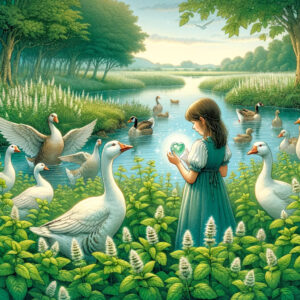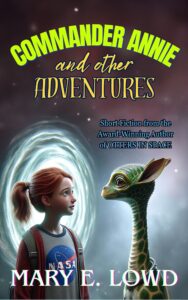by Mary E. Lowd
Originally published in Fantasia Divinity Magazine, January 2018

A hundred-some baby geese wandered through the field of mint. Shanna watched them from the river’s edge where she was busy washing the kitchen rags and tablecloths. She’d heard stories about geese who laid golden eggs and brothers transformed into swans, but she had no brothers who’d gone missing, and when she finished with the washing, she found no glints of gold hidden in the mint. Only a smooth, round stone that felt nice in her hand, so she slipped it into her pocket.
Shanna carried the washing back to the witch’s house and cowered when the witch, who she worked for, berated her for wasting time. The witch baked gingerbread and sold it to the local children. Shanna had been one of those children once, hungry and alone after her parents had sickened and died. She’d traded her freedom for a taste of the witch’s gingerbread, and yet she couldn’t regret it. Working her hands until they were sore and calloused, laboring for the witch, was a better life than dying in the streets.
Every day now, the geese wandered through the field beside the river, and Shanna watched them grow from fuzzy gray goslings into elegant long-necked fowl with a striking splash of white on each of their black-feathered heads. She sang to the geese as she washed clothes in the river or gathered mint leaves for the witch’s baking. They flocked about her, hoping for crumbs of gingerbread that Shanna swept from the floor of the witch’s house and brought to throw at the geese. She liked to pretend they loved her singing.
Come autumn, the geese flew away, and Shanna spent a lonely winter with the witch. After she finished her daily work, Shanna would sit beside the window in her small room and wonder where the geese had gone. She held the smooth, round stone in her hand, feeling its cool, dimply surface, and she imagined her flock of geese visiting faraway castles and kingdoms, places she would never go.
Occasionally while kneading a giant ball of gingerbread dough, the witch would stop to massage one hand with the other, straighten out her bent back, and mutter, “Someday, I’ll teach you to bake my special gingerbread.”
At first, Shanna’s heart filled with excitement at the idea. She was more than a laborer; she was the witch’s apprentice, earning the witch’s trust. But as the winter wore on, the witch’s mutterings felt more like a taunt, a trick to keep Shanna working hard. A drop of hope meant to forestall any complaints.
When the geese came back in the spring, Shanna greeted them like long lost friends. In return, they scattered and squawked, spreading their wings and flapping in their ungainly way about the mint field. Shanna told herself they were happy to see her, and she spent the spring and summer singing to them, watching a new batch of goslings grow, and learning to hate the witch for taunting her with promises she clearly wouldn’t keep.
Come autumn, Shanna’s heart began to freeze with anticipation of her goose friends leaving. In desperation, she waited one night until the witch had gone to sleep. Shanna lit a single candle, and spent hours poring over one of the witch’s spell books — a dusty ancient tome she’d been explicitly forbidden to ever touch. She cringed at every sigh of the wind, fearing the witch would wake.
Among the crumbling pages, Shanna found a spell to turn her smooth, round stone into a wishing stone. It was a powerful spell, and Shanna could hardly believe her luck at how easy it was to cast. A few words chanted, a few strands of her golden hair burned in the candle’s flame, and a drop of blood rubbed into the gray surface of the stone. That was all.
The next day, Shanna took her new wishing stone to the mint field, stood surrounded by her geese, and wished to be one of them. The stone fell from her hands as her fingers stretched and grew feathers. Her neck lengthened; her nose hardened and curved into a beak; her back hunched over, and her toes grew webbing between them. Shanna the goose shook herself free of her clothes, flapped her wings, and reveled in the new sensation.
Flying took practice, but she was used to working hard. By the time the flock began their migration, Shanna was flying with the best of them and proudly took her place in the V.
The geese flew over fields and rivers. They slept beside ponds and then took to flight again. At the end of their journey, Shanna found herself in a field beside a lake, dotted with forget-me-nots. It was not that different from the field of mint beside the river, near the witch’s house. There were no castles. No kingdoms. Only geese, but she could no longer sing to them. Her voice was nothing but a rasping honk.
Yet the sun was warm on her feathered back, and she had no chores. She passed the winter pleasantly, if dully, telling herself that she was glad to be free of the witch’s scolding and taunting promises. Though, she missed the broken pieces of gingerbread that the witch used to give her, claiming they were no good for selling. The witch had broken a lot of cookies.
By springtime, Shanna had nearly forgotten she was ever a girl and not a goose. She flew in the V from one swampy field to another until she found herself in a familiar field of mint beside a river.
An old woman sat beside the river, and when she saw the geese, she said, “My girl loved you geese. I miss her so.”
Shanna was startled by these words, and her goose nature told her to flap her wings, hiss, and fly away to the other side of the field. But the girl’s heart inside her pulled her toward the old woman.
“Hello, dear,” the old woman said to the goose. “Do you know what happened to my Shanna? I never got to teach her how to make my gingerbread.” The old woman reached into her pocket and then held out a spicy-smelling lump of cookie.
The goose took the gingerbread eagerly from the old woman’s hand and swallowed it down.
The old woman smiled sadly and said, “I never told her she was like a daughter to me. I wish I had her back.”
The word ‘wish’ sent an electric tingle through the goose’s body, down her long neck and out to the tip of every pinion feather. The goose honked, trying to say the words, “Wait — hold that thought.”
The old woman couldn’t have understood her, but she tilted her head, smiled strangely, and nodded anyway. The goose waddled off into the field of mint, poking her beak into the leaves here and there, searching for the smooth, round stone. When she found it, the goose lifted it with her beak, brought it back to the old woman, and dropped it beside her with another honk.
The old woman picked up the stone, turned it over in her hands, and said, “Oh, Shanna, wishing stones never work out well.” She looked at the goose. “You hate your wish now, don’t you?”
The goose flapped her wings and squawked, trying with all of her might to explain how lonely and bored she was as a goose. She wanted to sing again and hope that someday the witch would teach her to make gingerbread. As a goose, she had nothing to hope for. Just one field after another, all the same, all lovely, all dull.
The witch held the stone to her breast with both hands and said, “I wish for my daughter Shanna back.”
The feathers fell away from Shanna’s body, and the old woman wrapped a shawl around her while she reformed into a girl. The witch embraced her, and the girl spent many stumbled words, now that her tongue could form them again, apologizing for stealing the spell and running away. “You worked me hard,” Shanna said, “but you were always working hard too.”
“Hush,” the witch said. “All’s forgiven. Let’s go home, and I’ll teach you how to make my gingerbread. Today.”
The geese watched them leave, and the wishing stone lay in the field of mint, forgotten and waiting for another fairy tale to begin.
 Read more stories from Commander Annie and Other Adventures:
Read more stories from Commander Annie and Other Adventures:
[Previous] [Next]
